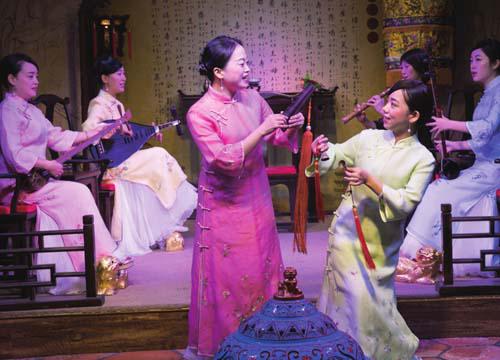Performing a Legacy
By Lu Yan
Every month, Su Zhiyin sets aside four or five days for her favorite hobby—singing nanyin. As a resident of Jinjiang, southeast Chinas Fujian Province, the 60-year-old retired business woman has been practicing the art for over two decades.
Nanyin is a musical performing art that originated during the Han Dynasty (206 B.C.-A.D. 220) and is central to the culture of the people living in the southern part of Fujian, as well as residents on Chinas southeastern coast and overseas Chinese of south Fujian origin.
Su told Beijing Review as she prepared backstage at the 12th Jinjiang Nanyin Festival, that for her, the traditional art is a part of life. “The magical power of singing nanyin can make all my worries go away,”she said.
Traditional music fossil
Su provides the vocal part in a nanyin song, which is sung in something like a dialect originally from south China. She and instrumentalists form the ensemble. There are two other ways to perform nanyin. One is purely instrumental and the other includes a humming voice, and sometimes a singer plays clappers while singing slow, simple and elegant melodies.
“When I sing, I relate to the stories and immerse myself in them completely,” Su said, explaining that the lyrics are usually about Chinese folktales and ancient poems.
The two main instruments used during a nanyin performance are a bamboo flute called dongxiao, and a pipa, a crooked-neck lute played horizontally. There are also other wind, string and percussion instruments involved.
In ancient times nanyin was performed at weddings and funerals and during joyful festivities in courtyards, markets and streets. Today, it continues to be deeply rooted in the social life of the people in south Fujian,with many nanyin clubs or societies dotting the regions where they live. Members get together regularly and enjoy the music fun.
Nanyin is one of the oldest existing music genres in China, but the ancient art is in danger as less people devote themselves to the art form.
Su Tongmou, 79, is a master performer of nanyin and also the founder of the Jinjiang Nanyin Association. He said most nanyin performers are amateurs, and although they have a passion for it, they hardly get to the quintessence of the art.
“There are doctoral students majoring in nanyin, but their knowledge is limited to theory,” Su noted, adding that it takes both a natural gift and hard work to really pursue nanyin. “I think few people are capable or willing to do it. Its a pity.”

